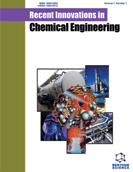Abstract
The increase in energy consumption throughout the globe with declining
global light-oil reserves necessitates the utilization of heavy crude oil reservoirs to
meet the demand. The processing of heavy crude oil in refineries creates extensive
loads on thermal and catalytic processes to upgrade them as well as to meet market
legislations. Heavy crude oil is rich in excess sulfur and other metals along with high
molecular hydrocarbons such as resins, waxes, asphaltenes, heavy aromatics, etc. The
separation of lighter hydrocarbon fractions is difficult as well as the processing of
vacuum residue also needs attention. The thermal processes break the heavy
hydrocarbons into smaller ones which later can be reformed or cracked using catalytic
processes. The catalytic processes cannot be employed directly as the impurities will
poison catalysts. Thermal processes such as vis-breaking, thermal cracking and coking
are highly energy intensive processes and mainly progress through free radical
mechanism. The application of ultrasound in the upgradation of heavy crude oil will
help in the reduction of energy requirements and load on these thermal processes. The
present chapter overviews ultrasound-assisted cavitation as an innovative method to
intensify the cracking of asphaltenes and other heavy hydrocarbon molecules existing
in the vacuum or atmospheric distillate residual.






















